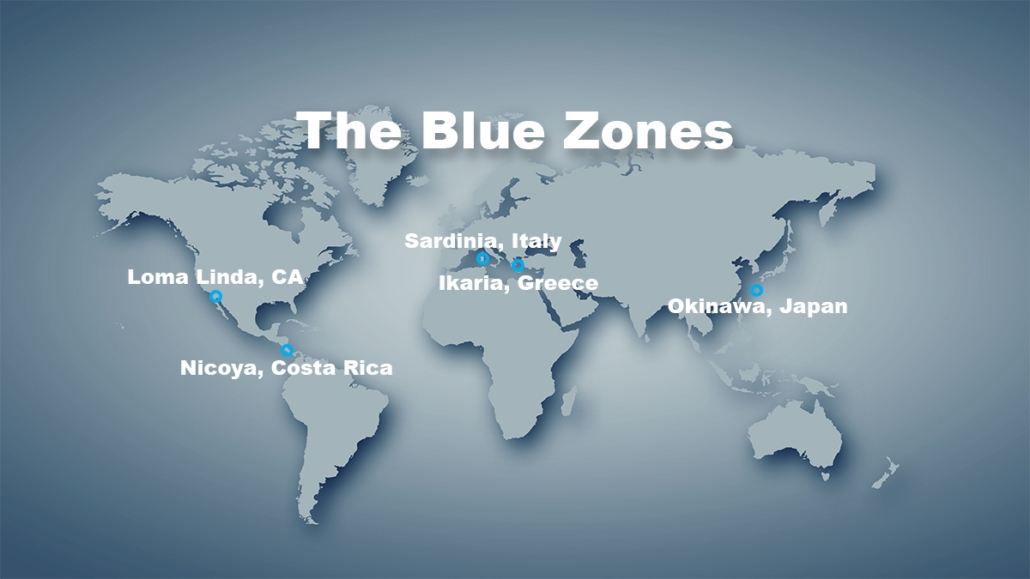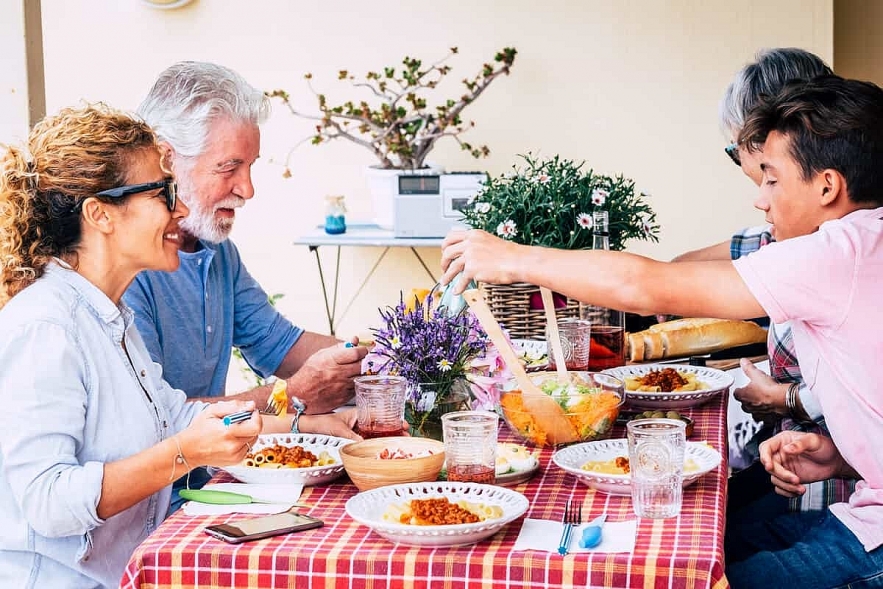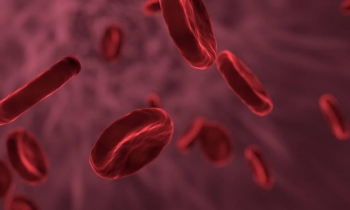Where Are "5 Blue Zones" With A Longest Life Expectancy in the World
 |
| The Blue Zones - Photo: LottaVeg.com |
| Table of Content |
The two scientists Gianni Pes and Michel Poulain were never in search of eternal life, but when they discovered a particular village in Sardinia in 2004, they did at least come a little closer to immortality.
Global life expectancy averages out to 71.4 years. That means, of course, that some parts of the world see much shorter life spans, while others enjoy far greater longevity.
The Discovery of the Blue Zones
Five places, in particular, fall into the latter category. They’re known as Blue Zones—named for the blue circles researchers drew to identify the first one on a map—and they’re home to some of the oldest and healthiest people in the world.
In 2004, Dan Buettner teamed up with National Geographic and the world’s best longevity researchers to identify pockets around the world where people live measurably longer and better. In these blue zones areas, they found that people reach age 100 at rates 10 times greater than in the United States.
After identifying five of the world’s blue zones, Dan and National Geographic took teams of scientists to each location to identify lifestyle characteristics that might explain longevity. They found that the lifestyles of all blue zones residents shared nine specific characteristics. We call these characteristics the Power9. - Noted by bluezones.com.
The breakthrough in this research, however, came with Dan Buettner, who devoted himself to the question of what actually made such a long life possible for the people in these “Blue Zones”. He examined these hotspots more closely and discovered several similarities, which might be the key to a longer life, according to onlyfunfacts.com.
| There are areas in many parts of our world where the average age is over 100 years. The common feature of those living in the "blue zones" is that they live in harmony with nature, value leisure and relaxation, but they also work hard, walk a lot and have a purpose in life, every morning they are aware of what they are waking up to. |
The Secret of the Blue Zones - Where Are Places
 |
| The Blue Zones are home to the happiest and healthiest populations in the world |
Dan Buettner identified a total of five “Blue Zones” that were of particular interest to him. These were the following places:
1.Sardinia (Italy, in particular the towns of Ogliastra, Ollolai and Bargbagia)
A largely plant-based diet, daily physical activity and familial closeness have given this Blue Zone the highest concentration of male centenarians in the world. (Sheep herders, who tend to walk at least five miles a day, and men with daughters, who may get especially tender care as they age, live even longer than most in this area.) It also doesn’t hurt that the M26 marker, a genetic variant linked to extreme longevity, has been passed down through generations in this secluded community.
2.Okinawa (Japan)
Located in Japan, Okinawa is best known for being home to the longest living women on earth. Okinawans typically live well into their 80s and beyond, largely without crippling disability or illness that commonly affects North Americans and people of many other countries around the world. Research has demonstrated that Okinawans have lower rates of age-related conditions, such as cardiovascular disease and cancer, compared to the rest of Japan and the United States.
3.Loma Linda (California, USA)
This community has the highest concentration of Seventh-day Adventists in the United States, and some residents live 10 more healthy years than the average American by following a biblical diet of grains, fruits, nuts, and vegetables.
Blue Zones is now dedicated to creating healthy communities across the United States. The first effort, in Albert Lea, Minnesota, was a “stunning” success, and formed the blueprint for the Blue Zones Projects.
4.The Nicoya Peninsula (Costa Rica)
In this region of Central America, residents have the world’s lowest rate of middle-age mortality and the second highest concentration of male centenarians. Their longevity secret lies partly in their strong faith communities, deep social networks, and habits of regular, low-intensity physical activity.
5.Icaria (Greece)
Approximately 8,000 people live on the small Greek island in the Aegean Sea known as Ikaria. The overwhelming majority of older people living in Ikaria report following a mostly plant-based diet, engaging in daily physical activity, socializing with friends and family frequently, avoiding smoking, and enjoying mid-day naps, all of which may contribute to their longer lifespans. (17) Older Ikarians are likely to remain physically active well into the 80s and 90s. A study investigating the longevity of Ikarians demonstrated that approximately 6 out of 10 individuals over the age of 90 participated in regular physical activity, including walking and other moderate-intensity activities.
| In each of these places, the inhabitants not only live to reach a particularly high age, but also possess the qualities for a healthy life. From 1996 to 2016, for example, Barbagia was home to 20 people over the age of 100, which remains a world record to this day. Icaria, on the other hand, has the highest proportion of inhabitants over 90 – one in three of them lives to reach at least this age. At the same time, the population has a 20 percent lower risk of developing cancer and a 50 percent lower probability of developing heart disease. Dementia diseases also hardly ever occur in these places. |
Open Questions
So the question remained, why the inhabitants of these places lived so long and remained so healthy.
Dan Buettner was able to identify some similarities. In short, you will live longer if you eat a healthy diet, do a lot of exercise and live in a loving community. But what exactly does it mean to exercise a lot and to follow a healthy diet?
The inhabitants of the five “Blue Zones” are setting an example. In general, none of the people in these places go to a gym or do regular endurance sports. Instead, people simply have an active lifestyle, which leads them to prefer to use their bicycles instead of their cars, to walk up stairs instead of taking the elevator, or to simply spend a lot of time gardening.
Their diet also differs from the typical diet of developed industrialized nations. In these places, people eat very little meat, a lot of legumes and nuts and drink very little alcohol. In Sardinia, people also often eat field beans, which are said to have a health-promoting effect.
Who are Living in the Blue Zones?
• Icaria (Greece): Icaria is an island in Greece where people eat a Mediterranean diet rich in olive oil, red wine and homegrown vegetables.
• Ogliastra, Sardinia (Italy): The Ogliastra region of Sardinia is home to some of the oldest men in the world. They live in mountainous regions where they typically work on farms and drink lots of red wine.
• Okinawa (Japan): Okinawa is home to the world’s oldest women, who eat a lot of soy-based foods and practice tai chi, a meditative form of exercise.
• Nicoya Peninsula (Costa Rica): The Nicoyan diet is based around beans and corn tortillas. The people of this area regularly perform physical jobs into old age and have a sense of life purpose known as “plan de vida.”
• The Seventh-day Adventists in Loma Linda, California (USA): The Seventh-day Adventists are a very religious group of people. They’re strict vegetarians and live in tight-knit communities.
It has not, however, been established unequivocally whether this is sufficient to explain their high life expectancy. It is very likely that the inhabitants of the five “Blue Zones” also have a certain genetic disposition that enables them to live a long life, but this would require further research.
Best Lessons from the Residents of the Blue Zones?
⦁ Family first, focus on family
Those living in close family ties can be sure that they will be cared for properly. People with a secure family background are less depressed and stressed, with a lower rate of suicide. Children and grandchildren are also there to help, but they also feel belonging to a family and have a purpose in life.
⦁ We respect the elderly!
Grandparents give love, help around children, wisdom, and hope, ensure the survival of traditions, and encourage grandchildren to prosper. It can be assumed that this will make children healthier, navigate the world more skillfully, and live to a higher age.
⦁ Let us walk!
Walking 8 or more kilometers a day by the Sardinian shepherds is extremely good for the cardiovascular system, but it also has a positive effect on the metabolism of muscles and bones.
⦁ Drink one or two glasses of red wine a day!
Restrained wine consumption may also explain men’s less stressful lives.
⦁ Let us have a good laugh with our friends!
Laughter reduces stress and the risk of cardiovascular disease.
⦁ Let our diet be based on vegetables!
Okinawians live a vegetable-based diet for most of their lives that is rich in nutrients but low in calories.
⦁ Let us garden!
The traditional Okinawan "moai" means a safe social network. It provides financial and emotional support when needed, as they know someone is always there for them.
⦁ Let us have a "moai"!
The traditional Okinawan "moai" means a safe social network. It provides financial and emotional support when needed, as they know someone is always there for them.
⦁ Have ikiaga!
It is important that we have goals, this is called the Ikiagi, why it is always worth waking up. Ikiagi means at the same time what you love to do, what you are good at, what you are paid for, and what the world needs. That is, the intersection of passion, mission, vocation, and profession.
⦁ Enjoy the sunshine!
With regular sun exposure, vitamin D in the body results in stronger bones and a healthier body. "Smart" sunbathing (15 minutes on the arms and legs) is a good addition to our diet.
⦁ Stay active!
Elderly residents walk and garden a lot. There is little furniture in their homes, and residents spend their meals and relax on the ground, sitting on a tatami. The elderly often sit and stand up daily, strengthening their body muscles and balance system.
⦁ Grow herbs!
Mugwort, ginger and turmeric are the mainstays of Okinawan gardens, all of which have been proven to have a healing effect. Their regular daily consumption, for example, keeps diseases away from the people of Okinawan.
⦁ Appreciate what we have!
They are able to leave their troubled initial years in the past while enjoying the simple pleasures of today. They have learned to be lovable and to attract young people to their company.
⦁ Find a weekly getaway
One day a week, break your daily routine. Let us find a day to spend our time in nature with family and friends.
⦁ Maintain your healthy body mass index (BMI)
Those with a healthy BMI (that is, when the individual’s height is matched by an appropriate body weight) who live an active life and rarely or not eat meat at all are less prone to getting a disease.
⦁ Move moderately and regularly
Regular, less intense exercise, such as walking, can reduce the chances of heart disease and certain cancers.
⦁ Spend time with like-minded friends and reciprocate
It gives them a good feeling that their values are the same and that they support each other's habits. People are far from avoiding depression if they can also focus on helping others.
⦁ Snack seeds
To date, at least four major studies have demonstrated the positive effects of oily seeds on health and longevity.
⦁ Have an early light dinner
With a light, early dinner, you can avoid destroying your body with calorie bombs during the inactive, resting time of day. It also has a positive effect on sleep quality and keeps BMI lower.
⦁ Drink plenty of water
Men who consumed extra 5-6 glasses of water a day significantly reduced their chances of a fatal heart attack.
⦁ Have a "plan de vid"
Lucky centenarians have a strong purpose in life. They feel the needed by others and want to contribute to a better world.
⦁ Foster a wide range of human relationships
Centenarians in Nicoya often visit their neighbors. They learned how to listen, laugh, and appreciate their values.
⦁ Work hard
It seems that centenarians have always enjoyed doing physical work in their lifetime. They take pleasure in everyday tasks.
⦁ The power of a common past
The Chorotega’s sense of belonging to the natives and their traditions alleviates and somewhat relieves the lives of modern Nicoyans.
Diets in the Blue ZoneVegetables: They’re a great source of fiber and many different vitamins and minerals. Eating more than five servings of fruits and vegetables a day can significantly reduce your risk of heart disease, cancer and death (11Trusted Source). Legumes: Legumes include beans, peas, lentils and chickpeas, and they are all rich in fiber and protein. A number of studies have shown that eating legumes is associated with lower mortality (12Trusted Source, 13Trusted Source, 14Trusted Source). Whole grains: Whole grains are also rich in fiber. A high intake of whole grains can reduce blood pressure and is associated with reduced colorectal cancer and death from heart disease (15Trusted Source, 16Trusted Source, 17Trusted Source). Nuts: Nuts are great sources of fiber, protein and polyunsaturated and monounsaturated fats. Combined with a healthy diet, they’re associated with reduced mortality and may even help reverse metabolic syndrome |
 | Interesting Facts About LG - a renowned brand to other smartphone ones! Using LG but do not know where it is from? Curious about its brand? Want to know more about this leading electronics brand? If you ... |
 | 10 Fascinating Facts about The Library of Congress - World's Largest Library What do you know about the largest library in the world, Library of Congress? If you are curious about this amazing construction, it is time ... |
 | 20 unknown facts about blood, the fluid in our body Blood plays a crucial role in supplying our organism with oxygen and nutrients every single seconds. However, blood is much more than just a red ... |























